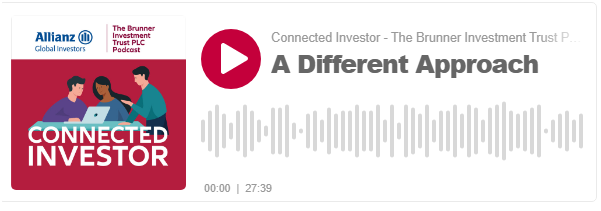Sep
2021
Brunner Investment Trust PLC: A Different Approach
DIY Investor
26 September 2021


In the latest instalment of the Connected Investor podcast Portfolio Manager Matthew Tillett considers recent comments about US interest rates which shook bond and equity markets, the impact of the rollout of vaccines in many developed markets, and how it is turning investors away from growth stocks to look at other types of investments.
Joe Lynam: Matthew, how have markets been since we last did this in mid-November?
Matthew Tillett: Much has changed Joe; markets then were driven by those benefiting from lockdowns, particularly technology companies. The shift since then has been driven in the main by the vaccine – the positive results from the trials, and then from the rollout; also we have still got a very supportive policy environment, and fiscal policy. Then there is the prospect of economies opening up and the pent-up demand from those less affected by Covid that have more money than they had a year ago; commodity prices rallied hard, inflation expectations rose, bond yields recovered and value outperformed growth.
JL: 10-year US government bonds were at 0.8% in November, now they’ve doubled to 1.6%; what is going on?
MT: They were very low before, but the market expects a much stronger economy, and potentially higher inflation; bond yields respond to demand as well as looking ahead to a tapering of monetary support and potentially higher interest rates.
JL: What have people invested in over the last three months, and what are they getting out of?
MT: Put simply, it’s a reverse of what we saw at the start of the pandemic when initially everything fell followed by a strong rebound amongst sectors like technology, but not cyclical sectors like commodities, oil and gas, travel and leisure; these are the areas that are recovering now.
JL: Thoughts on Bitcoin Matthew?
MT: Even if I wanted to consider Bitcoin – which I don’t – it’s not what the Brunner Investment philosophy is about.
‘cyclical sectors like commodities, oil and gas, travel and leisure; these are the areas that are recovering now’
JL: With money piling into Bitcoin, Tesla and Gamestop, have some investors been illogical?
MT: The question is, are we in a stock market bubble? One viewpoint is that there is a bubble when valuations are elevated because people are buying stocks just because others are. Alternatively, a behavioural approach asks are people doing crazy speculative things that don’t make any sense, and there are some worrying signs, but it’s quite isolated to a number of-
JL: Reddit fans.
MT: Exactly, we don’t really see it. The US looks elevated but it has a lot of highly valued tech stocks, so it doesn’t look to be like a bubble to me at this stage.
JL: Now that Joe Biden has command of the senate, the house and the oval office, will his $1.9 trillion stimulus package have a major impact on the global economy and is there a downside of a lot of money chasing limited resources and inflation?
MT: It’s clearly a huge amount of money and a much bigger stimulus than was applied after the financial crisis which was arguably a much deeper and more long-lasting downturn; it looks like we may be coming out quite quickly, so it has the potential to stimulate significant GDP growth and a rapid recovery. However, there are still longer-term structural issues facing Western economies: over-indebtedness, which existed pre- Covid has got worse, putting downward pressure on economic growth and the demographics in general are not particularly favourable either-
JL: Certainly in bits of Europe and in Japan.
‘it looks like we may be coming out quite quickly’
MT: Yes, the US to be fair is actually relatively better; I’m seeing it as a shorter-term impact that will benefit more cyclical areas of the economy and the financial markets.
JL: It’s not just the US, there’s going to be a massive stimulus in the EU, Japan and other major economies as well; China is probably the only place that doesn’t need stimulus as it’s aiming to grow by 7% this year.
MT: Extraordinary amounts of money; after the financial crisis policy makers and academics feared bond markets wouldn’t accept such stimulus, and inflation would soar leading to financial chaos, but the last 10 years suggests that’s not the case, and there’s less focus on austerity.
JL: Austerity was imposed to deal with debt run-up by the financial crisis, but debts this time will be far higher; why has the bond market not said, ‘woah, we’re not going to continue to lend’? Will this money ever be repaid – is it just invented money or something to be passed on to future generations. How can debt which was a problem a decade ago, suddenly not be an issue?
MT: It’s a good question; if you’d told me 10 years ago that we would be in this position and taking it to even further extremes, I would have said I didn’t believe you. But markets, and particularly bond markets are very hard to predict; I think what ultimately turns them is inflation which, paradoxically, is what a lot of people seem to want at the moment, but sustained, high inflation is not necessarily good because that’s when bonds really lose their appeal, making it hard for central bankers to control the environment. If high rates of inflation come through, then-
JL: You can’t cut interest rates, can you? If inflation stays high and interest rates are already almost zero.
MT: Yes, and if the real interest rates are so low that people don’t want to hold government bonds anymore, you’re either going to have to let them go up, or introduce even more severe financial repression; when people talk about inflation as a positive they should be careful what they wish for. But, it’s difficult to see any other way to de-lever. After the Second World War we had very high debts; interest rates were kept well below the rate of inflation, bonds performed terribly, but we got the debt down.
JL: Do you think it’s exaggerated to say that we could have a repeat of the Roaring Twenties because of this stimulus and the fact there’s a lot of pent-up savings and demand out there that could just explode into the market?
MT: From a cyclical perspective there definitely is the potential for that, the question I have is how sustained that would be?
JL: The vaccine is a scientific success story; will it play a big role in how financial markets and economies behave as they emerge from the cocoon?
‘results so far have generally been better than expected and that it’s a great triumph for the healthcare industry’
MT: Absolutely. We have gone from wondering if herd immunity was the way out of the pandemic to developing and starting to roll out a vaccine in double quick time with levels of efficacy that have surprised even the healthcare experts. My reading is that the results so far have generally been better than expected and that it’s a great triumph for the healthcare industry.
JL: I got my jab and feel pretty good about the whole thing; will healthcare stocks continue to be in favour, or is that now priced in?
MT: Really interesting question; it’s a sector that we like a lot in the Trust, and Covid aside it’s a great sector for finding high-quality businesses. It’s also got long-term structural growth drivers – aging populations, increases in wealth around the world; we have a lot of holdings, and they were good for us in the first part of last year because they held up better than most, but recently the sector’s been the wrong side of the rotation because it’s quite a defensive industry. Healthcare doesn’t really benefit from reopening or cyclical recovery, so some valuations have fallen back, presenting an opportunity for long-term investors. I think that there will be more spending on healthcare structurally as a result of Covid. Infrastructure failings in the UK and US meant we hadn’t initially done as well as other places as we don’t have enough equipment, beds and testing and diagnostic equipment; that’ll be rectified, I think, which will lead to more spending and more opportunities for some of the businesses that we’re invested in.
JL: The AIC, the Association of Investment Companies, appointed the Brunner Investment Trust as: a Dividend Hero. You posted pretty decent dividends; tell us how you got on.
 MT: We had a good year: portfolio outperformed the benchmark, as did NAV and we increased the dividend as well for the 49th year in a row; a Dividend Hero is an investment trust within the AIC sector that has increased its dividend for more than 20 years in a row. A great advantage of investment trusts is, unlike open-ended funds, they can put some profit aside in good years to build a reserve that can be called upon in times of recession – or pandemic – in order to continue paying a rising dividend. Brunner has done this several times over that 49-year period, including during the global financial crisis and last year. Most encouraging is that when we look forward, dividend payments are coming back and most importantly in the companies we’re invested in. We run a balanced portfolio, so we do have some cyclical businesses that were impacted last year, but we’re seeing almost all of those are now starting to reinstate dividends as they see their trading and their prospects recover.
MT: We had a good year: portfolio outperformed the benchmark, as did NAV and we increased the dividend as well for the 49th year in a row; a Dividend Hero is an investment trust within the AIC sector that has increased its dividend for more than 20 years in a row. A great advantage of investment trusts is, unlike open-ended funds, they can put some profit aside in good years to build a reserve that can be called upon in times of recession – or pandemic – in order to continue paying a rising dividend. Brunner has done this several times over that 49-year period, including during the global financial crisis and last year. Most encouraging is that when we look forward, dividend payments are coming back and most importantly in the companies we’re invested in. We run a balanced portfolio, so we do have some cyclical businesses that were impacted last year, but we’re seeing almost all of those are now starting to reinstate dividends as they see their trading and their prospects recover.
JL: Did you guys attract investors when dividend payments were stopped or slashed when the first lockdown happened?
MT: Quite possibly – you’d have to ask those investors. We just do what we do, and I think a lot of people that have owned Brunner for a long time understand that; they know what to expect, and I hope that our performance over the last year shows that we continue to do what we say on the tin. One of the unusual features of investment trusts is that when you invest in them, the share price doesn’t necessarily have to be the same as the net asset value – it can be more or it can be less; right now Brunner is actually trading at quite a wide discount – over 10% – to the net asset value, which means you’re effectively buying the investments that the Trust has at 10% less than their market value.
Find out more about Brunner Investment Trust PLC here >
To buy this trust login to your EQi account
Select the Brunner Investment Trust – GB0001490001
All sources Allianz Global Investors GmbH unless otherwise noted. This is no recommendation or solicitation to buy or sell any particular security. A security mentioned as example above will not necessarily be comprised in the portfolio by the time this document is disclosed or at any other subsequent date. Investing involves risk. The value of an investment and the income from it may fall as well as rise and investors may not get back the full amount invested. Past performance is not a reliable indicator of future results. The views and opinions expressed herein, which are subject to change without notice, are those of the issuer and/or its affiliated companies at the time of publication.
This is a marketing communication issued by Allianz Global Investors GmbH, an investment company with limited liability, incorporated in Germany, with its registered office at Bockenheimer Landstrasse 42-44, D 60323 Frankfurt/M, registered with the local court Frankfurt/M under HRB 9340, authorised by Bundesanstalt für Finanzdienstleistungsaufsicht (www.bafin.de). Allianz Global Investors GmbH has established a branch in the United Kingdom, Allianz Global Investors GmbH, UK branch, 199 Bishopsgate, London, EC2M 3TY, www.allianzglobalinvestors.co.uk, deemed authorised and regulated by the Financial Conduct Authority. Details of the Temporary Permissions Regime, which allows EEA-based firms to operate in the UK for a limited period while seeking full authorisation, are available on the Financial Conduct Authority’s website (www.fca.org.uk). Details about the extent of our regulation by the Financial Conduct Authority are available from us on request. The Brunner Investment Trust PLC is incorporated in England and Wales. (Company registration no. 226323). Registered Office: 199 Bishopsgate, London, EC2M 3TY.
Commentary » Investment trusts Commentary » Investment trusts Latest » Latest » Mutual funds Commentary


Leave a Reply
You must be logged in to post a comment.